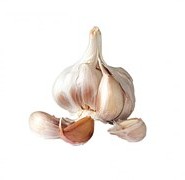
When it comes to your animal’s health, you want to follow facts, not fears. It’s easy for rumors and misinformation to arise, and thanks to the Internet these rumors can grow and spread fast. One of the things that have come under attack recently is garlic. You’ve probably heard on the one hand that garlic is a safe and healthy herb for your animals, only to read somewhere next day that it’s dangerously toxic and should be avoided. Which is correct?
The onion connection
The confusion surrounding garlic arises primarily from its close ties to the onion family. Onions have a high concentration of thiosulphate, a substance that can trigger hemolytic or Heinz body anemia in dogs, a condition where circulating red blood cells burst. When it comes to onions, a single generous serving can cause this reaction.
“Onions are only one of the substances which can cause Heinz body anemia,” adds Wendy Wallner, DVM. “Other substances such as acetaminophen (Tylenol) and benzocaine-containing topical preparations can also cause Heinz body anemia in the dog.” Benzocaine probably accounts for many cases of the illness because it is prevalent in creams often recommended for allergy-suffering animals. It is absorbed through the skin and builds up in the bloodstream. In fact, this substance is often likely to have been involved in cases where garlic was suspect.
Garlic itself simply does not contain the same concentration of thiosulphate as onions do. In fact, it is barely traceable in garlic, and is readily excreted from the body. Despite this, garlic is falling victim to mass hysteria. There are 51,174 websites devoted to warnings about the toxicity of garlic. Yet there is little scientific data to back this claim other than those small amounts of thiosulphate. There are still over 400,000 sites proclaiming the benefits of garlic, many from reputable holistic veterinarians who have widely used it in their practice for many years.
Garlic’s health benefits
As long as humans have been using herbs, garlic has been a primary remedy. And as long as people have been using garlic, they have also been feeding it to their animals. Its properties have proven far-reaching and safe to use.
In the past 50 years, during the rebirth of holistic medicine in the United States, garlic has been in the forefront. Every text I have researched on herbal health care for animals has recommended it, especially for its incredible anti-parasitic and antiseptic properties.
In my own experience, garlic has also benefited animals with cancer, diabetes, liver, heart and kidney disease, uncontrollable staph infections and a host of other conditions. It is a staple in my recommended preventative protocols, and has been widely used in hundreds of thousands of animals with no reported negative side effects (except on breath!).
In other words, it’s fine to use garlic in reasonable doses. Trust history over hysteria!
What form is best?
Raw garlic fed daily may be hard on the GI tract and cause digestive upset or diarrhea. This means your animal can’t really eat enough to get true therapeutic dosages. Dehydrated powder or cooked garlic has gone through a heat process that destroys much of its benefits, so the best form to use is a purified extract, often fed in a gel cap. This form can easily get into the intestines in concentrated amounts, benefiting the animal without digestive upset. Dosage is approximately 1/2 capsule for a small dog and up to 2 capsules for a large dog.
by LISA S. NEWMAN, ND, PH.D.